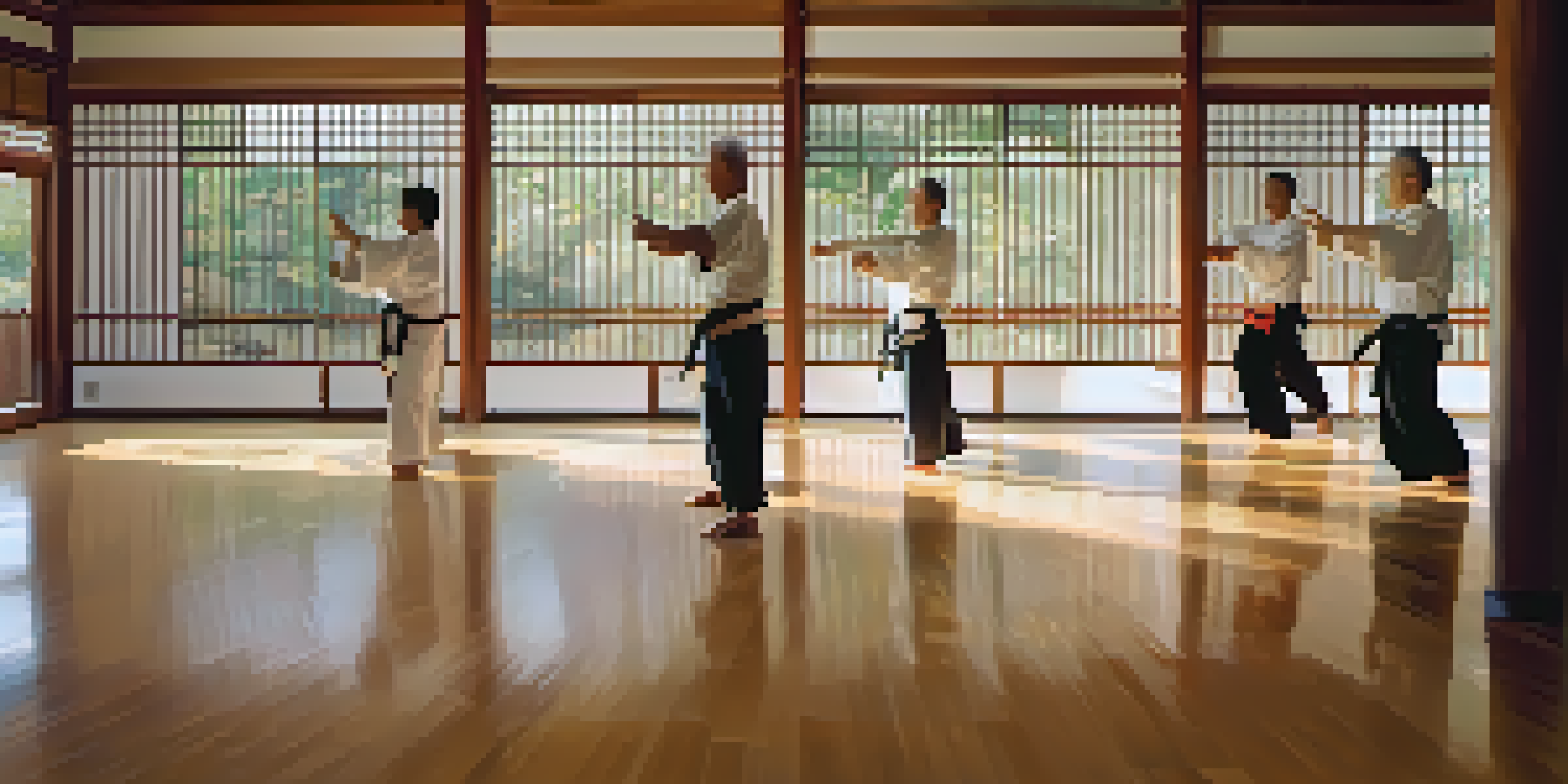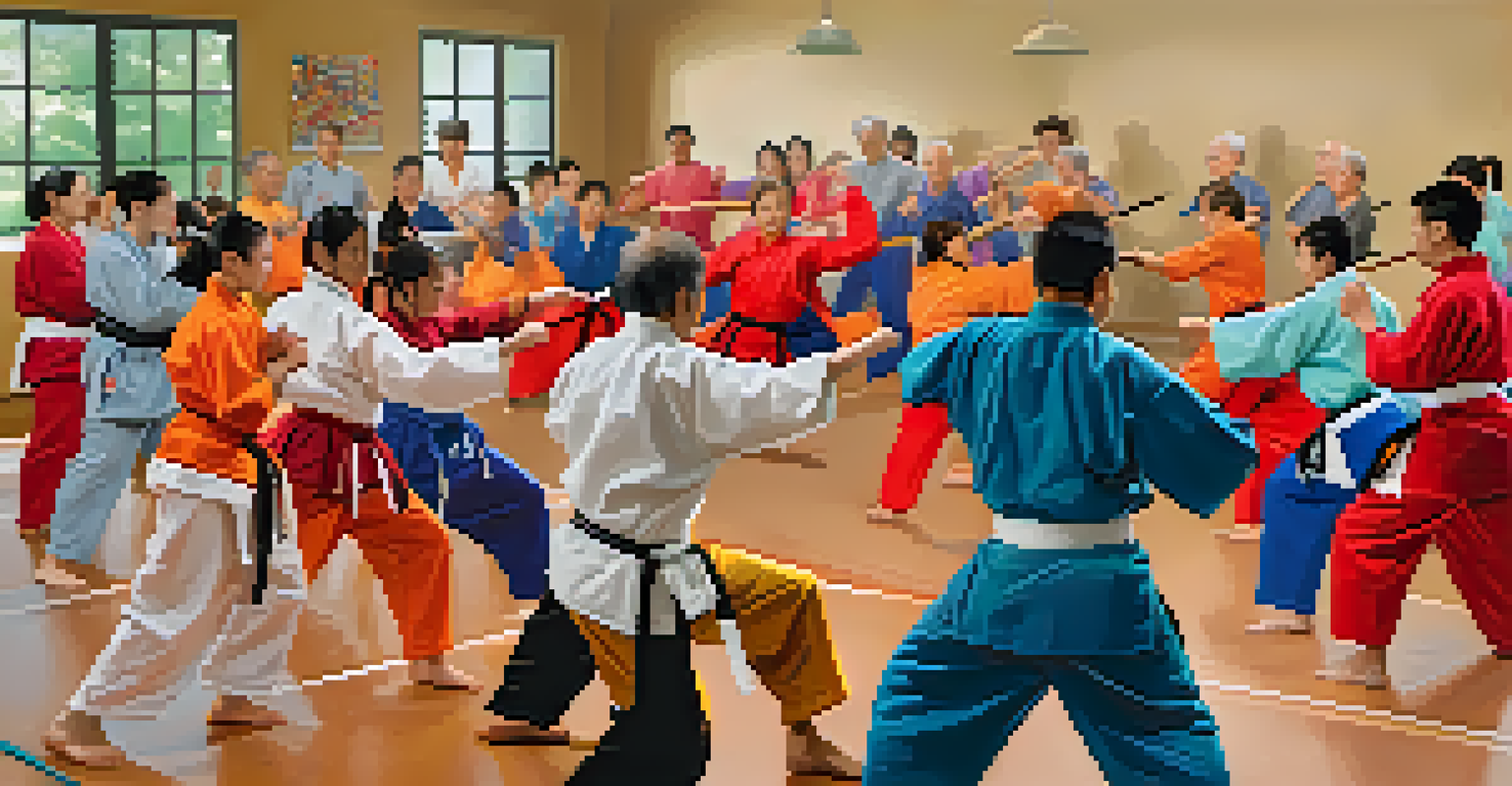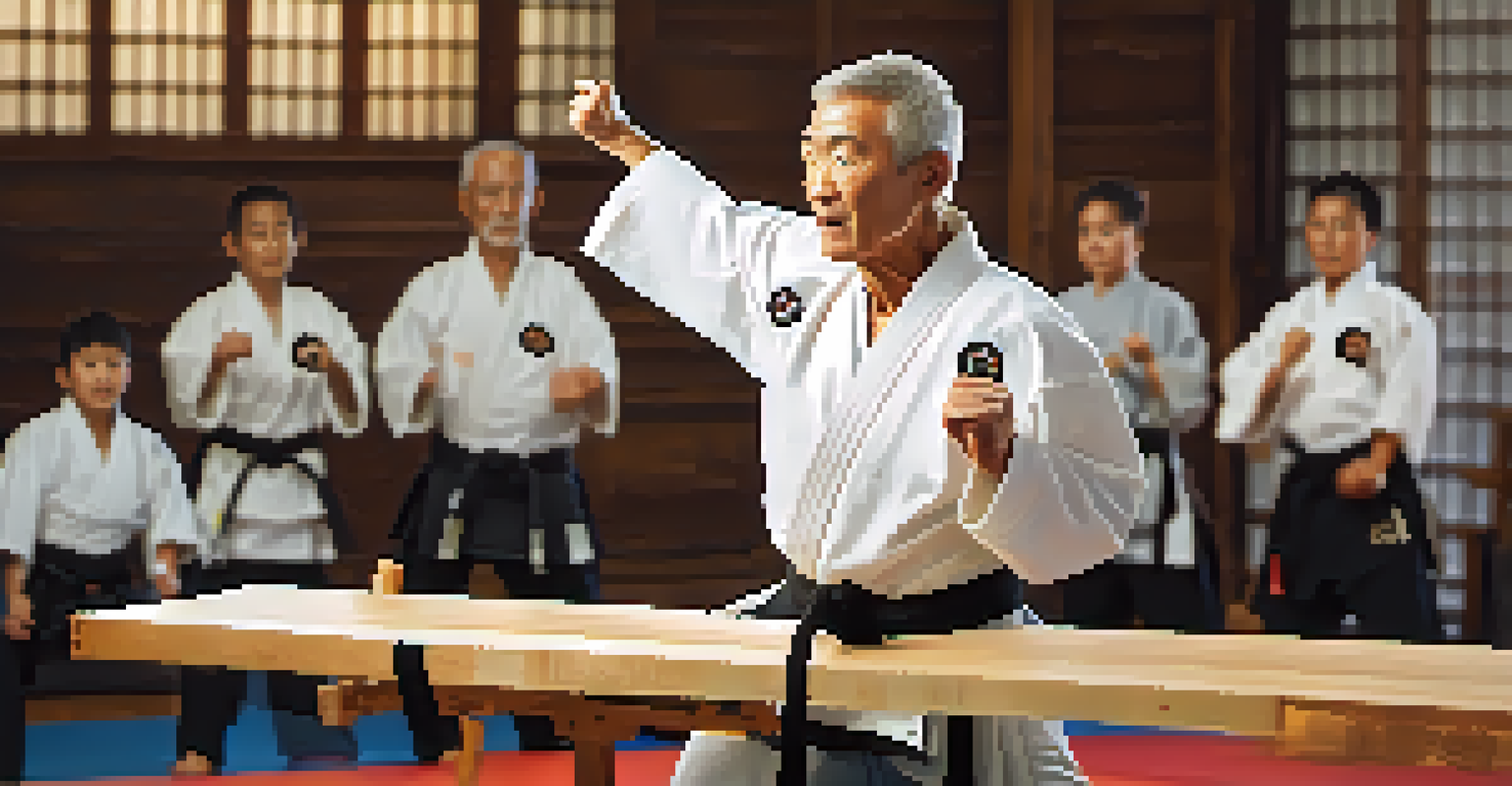How Martial Arts Can Improve Mental Health in Older Adults

Understanding the Mental Health Benefits of Martial Arts
Martial arts have long been recognized for their physical benefits, but they also offer significant mental health advantages, especially for older adults. Participating in these activities can lead to improved mood, reduced anxiety, and a general sense of well-being. This is primarily due to the combination of physical exercise, mental focus, and social interaction that martial arts provide.
Martial arts are not just about fighting; they are about building character and confidence.
When older adults engage in martial arts, they not only work on their physical skills but also train their minds. Techniques such as mindfulness and breathing exercises are often integral parts of martial arts training, which can help in managing stress and enhancing mental clarity. This holistic approach contributes to an overall improvement in mental health.
Moreover, the discipline required in martial arts fosters a sense of achievement and self-esteem. As older adults learn new techniques and progress in their training, they gain confidence, which can combat feelings of isolation or inadequacy that may arise with age.
Building Community and Social Connections
One of the most enriching aspects of martial arts is the community it creates. Older adults often face loneliness, but joining martial arts classes can provide a supportive network of peers. This sense of belonging is crucial for mental health, as social connections can significantly reduce feelings of isolation.

In class, participants engage in partner drills and group exercises, fostering camaraderie and shared experiences. Such interactions can lead to friendships that extend beyond the dojo or training space, enhancing emotional support systems. The shared challenge of learning martial arts can be a bonding experience that lifts spirits.
Mental Health Benefits of Martial Arts
Martial arts provide older adults with improved mood, reduced anxiety, and enhanced mental well-being through physical exercise and social interaction.
Additionally, instructors often encourage a culture of respect and support, which helps build trust among participants. This environment allows older adults to feel valued and empowered, which is a vital aspect of maintaining mental well-being as they age.
Improving Cognitive Function Through Practice
Martial arts require a considerable amount of mental engagement, which can help improve cognitive function in older adults. The need to memorize techniques, sequences, and forms exercises the brain, promoting mental sharpness. Engaging in such activities can help stave off cognitive decline by keeping the mind active and engaged.
Self-discipline begins with the mastery of your thoughts. If you don't control what you think, you can't control what you do.
Moreover, martial arts often involve strategic thinking and problem-solving during sparring or competition. This mental workout is beneficial for older adults, encouraging them to think on their feet and react quickly. Such cognitive challenges can be both stimulating and enjoyable, making the learning process a rewarding experience.
Additionally, the focus required during martial arts practice can enhance concentration and mindfulness, enabling older adults to stay present in the moment. This practice can translate to improved overall cognitive health, making daily tasks easier and more fulfilling.
Enhancing Physical Health for Better Mental Well-Being
The physical benefits of martial arts cannot be overlooked, especially when considering their impact on mental health. Regular physical activity is known to release endorphins, often referred to as 'feel-good' hormones, which can elevate mood and reduce feelings of anxiety. For older adults, maintaining physical health is crucial, as it directly influences mental well-being.
Martial arts provide a low-impact way to improve strength, flexibility, and balance, which are essential for preventing falls and injuries. Feeling physically capable can significantly boost an older adult's confidence, further enhancing their mental state. As they gain strength and mobility, many find a renewed zest for life.
Community and Social Connections
Joining martial arts classes helps older adults build supportive networks, reducing feelings of loneliness and fostering emotional well-being.
Additionally, the structured nature of martial arts classes can instill a routine, which is beneficial for mental health. This sense of predictability can create a comforting framework in an often unpredictable world, allowing older adults to feel more in control of their lives.
Fostering Discipline and Mindfulness
Martial arts inherently teach discipline, which can have profound effects on mental health. Older adults learn to set goals, work diligently towards them, and celebrate their achievements. This process can help cultivate resilience, enabling them to face life's challenges with a positive mindset.
Mindfulness is another crucial aspect of martial arts training. Techniques such as meditation and controlled breathing not only improve focus but also help reduce stress and anxiety. These practices encourage older adults to slow down and be present, which can lead to greater emotional regulation.
Incorporating mindfulness into daily life can transform how older adults respond to stressors, making them feel more grounded and less overwhelmed. This newfound perspective can significantly enhance their quality of life, leading to more fulfilling interactions with others.
Setting and Achieving Personal Goals
Martial arts provide a unique opportunity for older adults to set and achieve personal goals, which is essential for maintaining mental health. Whether it's mastering a new technique or earning a belt promotion, these milestones can be incredibly motivating. Achieving such goals fosters a sense of purpose and accomplishment.
Setting goals in martial arts can also enhance self-discipline and commitment. The journey to improvement requires perseverance, and as older adults see their progress, they gain confidence in their abilities. This sense of achievement can be a powerful antidote to feelings of helplessness that sometimes accompany aging.
Boosting Confidence and Resilience
Achieving personal goals in martial arts enhances self-esteem and resilience, empowering older adults to face life's challenges with a positive mindset.
Moreover, celebrating these successes—no matter how small—can create a positive feedback loop. As older adults experience the joy of accomplishment, they are likely to set new goals, further enhancing their mental resilience and overall happiness.
Overcoming Fears and Building Confidence
Starting martial arts can be daunting for anyone, especially older adults who may worry about their physical capabilities. However, confronting these fears in a supportive environment can be incredibly empowering. As they progress, older adults often find their confidence growing, which is key to improving mental health.
The gradual nature of learning martial arts allows participants to build their skills at their own pace. Each small victory—whether it’s perfecting a kick or sparring with a partner—fuels a sense of accomplishment and boosts self-esteem. This newfound confidence can spill over into other aspects of life, encouraging older adults to take on new challenges.

Additionally, martial arts training often emphasizes respect and perseverance, which can help older adults develop a more positive self-image. By learning to trust their abilities, they can approach life with a renewed sense of vigor and optimism, making the world feel more accessible and less intimidating.